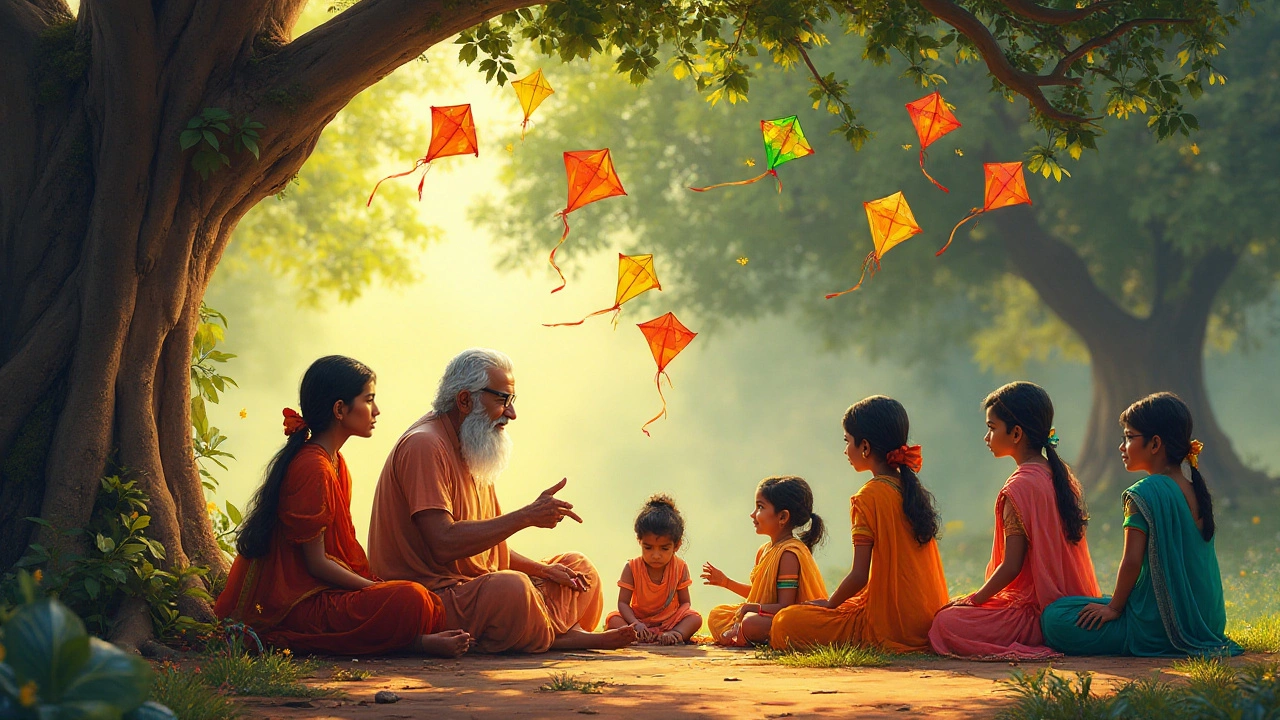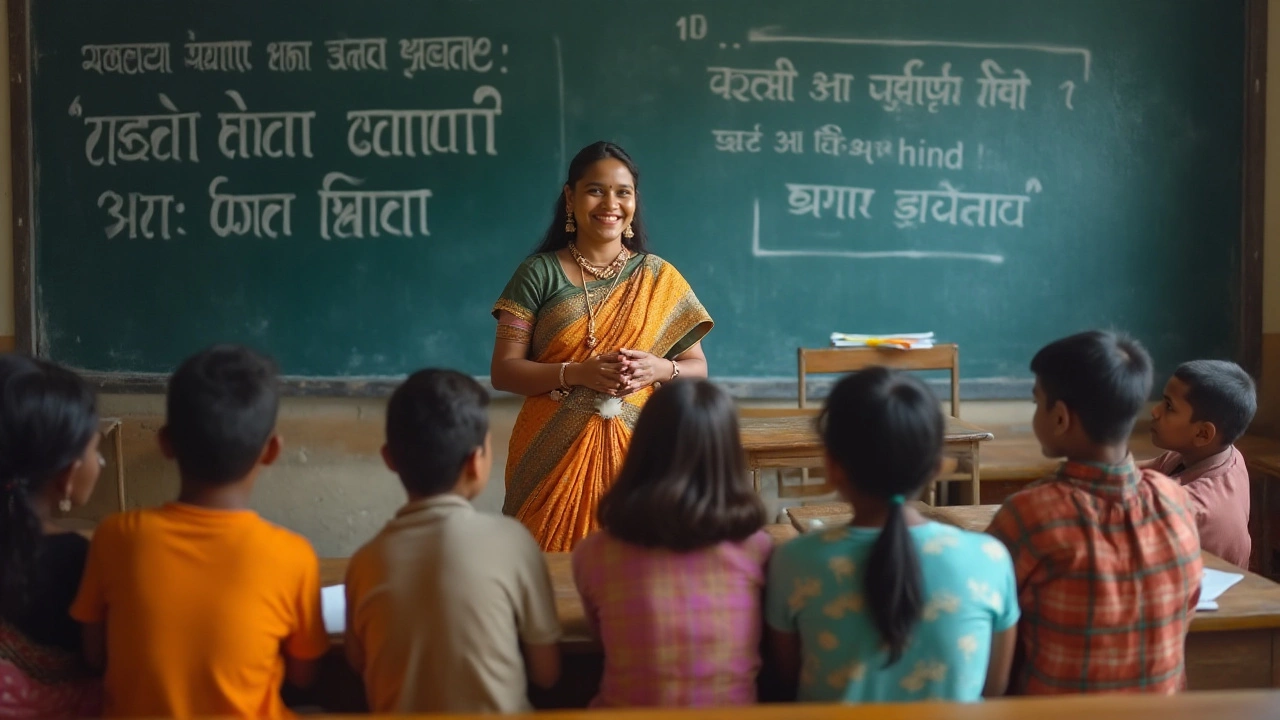Famous Indian Phrases: Traditional Wisdom and Inspiration
 Jan, 9 2025
Jan, 9 2025
India is a land brimming with languages, dialects, and expressions that reflect the diversity and depth of its culture. Common Indian phrases carry within them centuries of tradition, philosophy, and lessons that continue to inspire people in everyday life.
From proverbs that echo the teachings of ancient sages to contemporary sayings that speak to the modern soul, these expressions offer a glimpse into the wisdom and values cherished in Indian society.
As we journey through some of these iconic phrases, we uncover the stories they tell and the truths they reveal. Embark on this exploration of words that resonate far beyond their literal meaning, capturing the heart and spirit of a vibrant nation.
- The Richness of Indian Phrases
- Popular Indian Proverbs And Their Meanings
- Cultural Context and Influence
- Finding Inspiration in Everyday Life
- Adapting Traditional Wisdom to the Modern World
The Richness of Indian Phrases
Indian phrases, steeped in history and culture, offer a unique lens through which to view the nation’s character. Rich in metaphor and humor, these phrases often serve dual purposes: to advise and entertain. From ancient Sanskrit to the myriad regional languages, each phrase spins a web of tradition and wisdom while capturing the essence of local life. Consider the Hindi saying "Doodh ka doodh, paani ka paani," which translates to "Setting things plain and simple." Such phrases are ingrained in the daily vernacular, reminding individuals of truths about clarity and honesty, principles valued across Indian communities.
The intrinsic beauty of these Indian phrases lies in their adaptability and timeless pertinence. For centuries, they have been passed down from generation to generation, reflecting the common psyche and societal norms. When we peek into the trove of Indian sayings, we see how language becomes an art form, using selective words and structures to pack wisdom into small, memorable phrases. Many of these proverbs and idioms spring from farming traditions, such as "Jiski lathi, uski bhains," meaning "The one who wields the stick owns the buffalo," exemplifying the power dynamics that are still relevant in today's society.
India's immense linguistic diversity adds layers to these expressions. Each region contributes its flavors, with phrases often resonating with local history, folklore, and customs, binding people together in a shared cultural and social fabric. This richness becomes evident when we realize that a single phrase can be reinterpreted across different languages while retaining a similar core message. In Tamil, a saying like "Vellaiyum pegathum sattekathe," which encourages balance and control, echoes this universality.
Rabindranath Tagore once expressed, "A mind all logic is like a knife all blade. It makes the hand bleed that uses it," which underscores how wisdom transcends simple logic within Indian discourse.
Deeply intertwined with the country's spiritual ethos, many phrases draw from epics like the Mahabharata and Ramayana. They provide an allegorical understanding of good versus evil, luck versus destiny. These expressions form a moral compass for many, reminding them of ethical living. As Winston Churchill once said about India, "It is a region of immense mystery, complexity and, in many respects, of continuing transformation," a statement mirrored in the nation's enriched phraseology.
Delving deeper, one may connect these phrases to themes of resilience and hope. For instance, in challenging times, a proverb like "Aasman ko choona hai to jameen se dosti zaroori hai" inspires, reminding us that while reaching for the sky, maintaining humility and grounding are essential. They encapsulate the aspirations of a nation that has endured triumphs and tribulations. An appreciation of these expressions not only provides a window into India's cultural ethos but also emphasizes universal truths and shared values, showcasing phrases as an art that marries tradition with the eternal human condition, beckoning us towards empathy.
Popular Indian Proverbs And Their Meanings
Indian proverbs have a unique way of conveying deep wisdom through succinct and often poetic expressions. These Indian phrases have been handed down through generations and are ingrained in daily conversations across the country. They serve as a guiding light in various aspects of life, offering simple yet profound insights. One such famous proverb is "Titli pakadta bachcha, sabko rangeen dikhaai dega." which translates to "A child chasing a butterfly sees everything colorful." This proverb encourages embracing innocence and wonder, reminding us to look beyond the mundane and find joy in the small things around us.
Another commonly quoted proverb is "Bhagwan ke ghar der hai, andher nahi." meaning "There's a delay in God's home, but never darkness." This saying highlights the belief in divine justice and the idea that even if we don't see immediate results, the universe has its way of balancing things out. It's a reminder to remain patient and trust the process, a theme deeply rooted in Indian philosophy. Hindi sayings like this reflect the spiritual intricacies of the culture and often provide solace during challenging times.
In the playful realm of friendship and humor, you'll find the proverb "Har chamatkar ko prajatantra ka moh le aata hai." translating to "Democracy brings a taste of surprise to every miracle." This witty expression comments on the unpredictable nature of political scenarios in the world's largest democracy. It serves as both a humorous critique and a nod to the resilient spirit of Indians who adapt and thrive amidst uncertainties.
"The wisdom of proverbs bridges generations, acting as a cultural heartbeat of understanding and shared experiences." – Amartya Sen
Moreover, inspirational quotes in Indian culture often revolve around resilience and perseverance. Take for instance, "Karat karat abhyaas ke, jadmati hot sujan." which translates to "With constant practice, even a dull mind becomes intelligent." This proverb illustrates the power of persistence and the belief in self-improvement. It urges individuals to engage in consistent efforts regardless of their initial limitations, highlighting a core value in many Indian proverbs.
Overall, these sayings not only enrich conversations but also provide timeless lessons. They capture the essence of Indian wisdom, emphasizing qualities like patience, hard work, and optimism. Through each of these phrases, one can gain a better understanding of the underlying philosophies that have shaped generations and continue to inspire millions across India and the globe.

Cultural Context and Influence
The common Indian phrases are steeped in cultural nuance and offer insights into the nation's rich tapestry of traditions and beliefs. These expressions are not just linguistic constructs; they are embodiments of collective wisdom passed down through generations. Each phrase carries with it a slice of history, reflecting the values and ethos treasured by Indian society.
Take for example the phrase "Atithi Devo Bhava," which translates to "The guest is God." This saying echoes the deep-rooted tradition of hospitality that is intrinsic to Indian culture. It highlights the practice of treating guests with kindness and generosity, a virtue deeply ingrained in Indian households. Such expressions have transcended time and continue to find relevance in modern-day interactions, offering a lens through which outsiders can understand Indian customs and social behavior.
In a country as diverse as India, where numerous languages thrive, phrases and sayings vary significantly from region to region, yet they all contribute to a shared cultural ethos. The teachings embedded in these expressions often stem from ancient scriptures, folklore, and oral traditions, which have been effectively preserved through everyday language. One could argue that these phrases serve as a unifying force, bridging linguistic disparities and fostering mutual understanding.
"Language carries culture, and culture carries, particularly through orature... the body of values by which we perceive ourselves and our place in the world," as Ngũgĩ wa Thiong'o aptly observed.
The power of Indian sayings also lies in their adaptability. They offer solutions, guidance, and reassurance, shaping perceptions and thought processes not only in personal spheres but also in broader societal engagements. For instance, the notorious saying "Sabka Saath, Sabka Vikas" or "Together, Everyone Moves Forward" has been echoed in political narratives, influencing policy-making and efforts toward national unity and growth.
Understanding these Hindi sayings reveals how they inspire everyday life by encouraging ethical behavior, mindfulness, and empathy. As we examine their ongoing influence, we see that these phrases are more than just spoken words; they are vehicles of philosophy, shaping individual and communal worldviews. They connect the past with the present, nurturing a sense of continuity and identity that stands resilient in the face of rapid globalization.
The presence of these traditional expressions on social media and online platforms illustrates their evolving role in modern discourse. They find new life as motivational quotes and wisdom-packed insights, circulating among wider audiences and bridging cultural divides. Their application goes beyond mere translation; it speaks to the heart of a message that resonates globally, proving that the essence of Indian wisdom is timeless and borderless, inviting all who listen to draw from its infinite well.
Finding Inspiration in Everyday Life
Finding inspiration among the intricacies of our daily routines is akin to discovering a treasure in the mundane. Indian phrases are scattered like jewels across life's various terrains, and they have a peculiar way of sneaking into our lives when we need them most. These gems hold an innate ability to uplift the spirit, soothe the soul, and transform ordinary moments into meaningful experiences. Whether it's a tough day at work or navigating the hustle and bustle of city life, there's an Indian saying ready to offer solace or motivation.
Many people in India often draw strength from the phrase "Sabr Ka Phal Meetha Hota Hai," translating to "Patience bears sweet fruit." This adage reminds us of the virtue of waiting and the sweet rewards that come with patience. In a world where instant gratification is a norm, this phrase gently nudges us to pause, be patient, and trust the process. The essence of this wisdom is visible in how farmers attentively nurture their crops, or how artists labor over their masterpieces, knowing that their diligence will one day bear fruit.
Another widely-quoted Indian proverb is "Har ek friend zaroori hota hai," which beautifully encapsulates the importance of friendships in enriching our lives. This saying highlights the notion that connections with others can be a profound source of happiness and inspiration. As sociologist and philosopher Zygmunt Bauman once remarked, "Without other people, we are lost." Connections with friends act as anchors, providing stability and encouragement through life's rollercoaster of events.
"The greatness of a culture can be found in its art, music, literature, and the everyday sayings of its people." - Maya Angelou
Let's explore these inspirations further. Consider the mantra "Atithi Devo Bhava" or "The guest is like God," which underscores the significance of hospitality and kindness. This phrase profoundly influences Indian social behavior, encouraging individuals to always extend warmth and generosity toward others. Hospitality shapes communities, builds bridges across cultures, and creates lasting memories. Imagine the shared smiles around a dinner table, the stories exchanged between strangers, all thanks to this powerful saying.
Table data below shows a glimpse of how Indian phrases influence different aspects of life:
| Phrase | Aspect of Life | Influence |
|---|---|---|
| Sabr Ka Phal Meetha Hota Hai | Personal Growth | Encourages patience and perseverance |
| Atithi Devo Bhava | Hospitality | Promotes kindness and inclusion |
| Har pal yahaan jee bhar jiyo | Living in the Moment | Encourages mindfulness and appreciation |
Each phrase's impact extends beyond mere words; it transforms attitudes and behaviors, leaving imprints on cultures and individuals alike. So, the next time an Indian phrase pops up in conversation, pause a moment, cherish its wisdom, and see how it fits into the tapestry of your own life. These age-old sayings not only provide inspiration but also invite personal introspection and growth, urging us to live each day with purpose and positivity. In discovering these expressions, we truly find the secret to infusing inspiration into the very fabric of our everyday lives.

Adapting Traditional Wisdom to the Modern World
As the world becomes increasingly interconnected, the treasure trove of Indian wisdom encapsulated in centuries-old phrases offers poignant insights that remain relevant even today. These age-old teachings hold significance in both personal growth and professional settings, serving as guiding lights in an ever-changing society. The timeless nature of Indian proverbs and sayings allows them to bridge the gap between past and present, offering a strong foundation rooted in ethical and philosophical guidance.
Incorporating traditional Indian phrases into modern life involves understanding and embracing their underlying principles. Many proverbs emphasize themes such as patience, resilience, and humility, which align with contemporary values and challenges. For instance, the phrase "Sabar ka phal meetha hota hai," which translates to "the fruit of patience is sweet," underscores the importance of perseverance in achieving long-term goals. This message resonates today just as strongly as it did in centuries past, motivating individuals to invest in patience and wait for desired outcomes.
Harmonizing Ancient Teachings with Contemporary Practices
To truly harness the power of these timeless words, it is essential to contextualize them within modern frameworks and scenarios. When examining how to apply Indian sayings to today’s world, consider the phrase "Jaisa karam vaisa phal," meaning "as you sow, so shall you reap." This concept highlights the impact of one's actions on future circumstances and is particularly relevant in areas such as sustainable development and social responsibility. By fostering an awareness of long-term consequences, individuals and organizations can make ethical choices that support both people and the planet.
Incorporating inspirational quotes and concepts from traditional Indian wisdom into education and corporate environments also promotes a culture of learning and innovation. Educational settings might emphasize collaboration and empathy rather than competition, guided by sayings that advocate for unity and teamwork. In business settings, adopting the wisdom found in these expressions can encourage ethical practices and foster a sense of shared purpose among employees. "Sarvajan sukhaye," meaning "for the happiness of all," is a reminder of the collective benefit of community-centric actions.
"Wisdom does not come overnight," reminds a well-known Indian saying, reflecting the gradual learning process and the depth of traditional knowledge accumulated over centuries.
Traditional wisdom, when adapted to fit new contexts, not only retains its original essence but enriches our understanding of contemporary life. As people across the globe face challenges unique to the modern age, the lessons encoded in Indian phrases provide an anchor of stability and a blueprint for overcoming adversity. Documented in countless texts and passed down through generations, these expressions remain a source of strength and comfort in navigating the complexities of today's world.